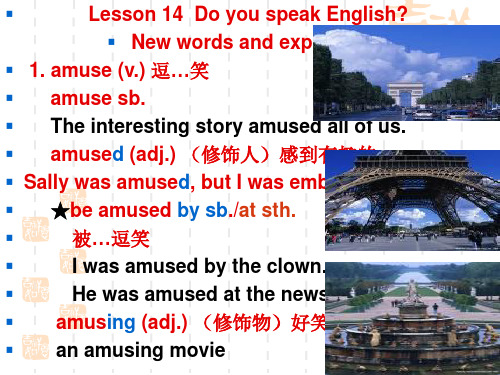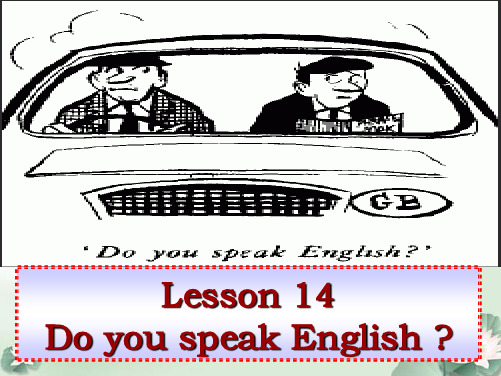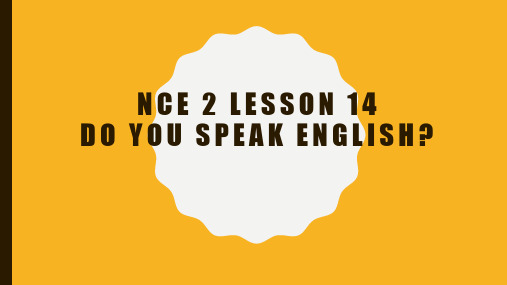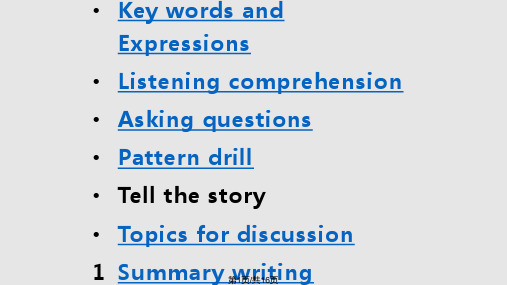新概念第二册Lesson14课件
(完整版)新概念英语第二册第14课

Lesson 14 Do you speak English?
▪ New words and expressions
▪ 1. amuse (v.) 逗…笑
▪ amuse sb.
▪ The interesting story amused all of us的
▪
(n.) 回复;答复
▪ I haven’t received a reply yet.
▪ 6. language (n.) 语言 ▪ ☺ native language/mother tongue ▪ ☺ a second/foreign language ▪ ☺ the English language=English ▪ ☺ language learner
▪ I had an amusing experience last year. ▪ ☺ have an experience ▪ ☺ amusing= interesting ▪ After I had left a small village in the south of
France, I drove on to the next town. ▪ ☺ in the south of France ▪ =in Southern France ▪ ☺ v.+ on 继续做… ▪ They talked on after the meeting. ▪ ☺drive on to sp. 继续开往… ▪ We drove on to London after having lunch in
▪ an amusing movie
▪ 2. experience (c.n.) 经历
▪ have an amusing/unpleasant experience
新概念2Lesson14Do you speak English 课件

interesting / funny story
★experience n. 经历(可数);经验(不可数) ① n. 经历(可数)
He has a lot of experiences. (经历,可数名词) ② n. 经验,体验(不可数) Does she have any experience in teaching? (经验,不可数名词) ③ vt. 经验,体验
3. Why did neither of them speak during the journey?
Passage analysisence last year. amusing adj. 好笑的, 有趣的 experience nc. 经历: 可数名词 experience nu. 经验 : 不可数名词
【New words and expressions】
amusing [ə'mju:ziŋ] adj. 好笑的,有趣的 experience [iks'piəriəns] n. 经历 wave [weiv] v. 招手
lift [lift]
n. 搭便车
reply [ri'plai] v. 回答 language ['læ ŋɡwidʒ] n. 语言 journey ['dʒə:ni] n. 旅行
【New words and expressions】
★amusing adj. 好笑的, 有趣的 The story is amusing.这故事很好笑 amused adj. 感到好笑的(要笑出声) I am amused.我感到很开心。 amuse v. 使发笑,使愉快 The story amused me. funny adj. 好笑的(不一定要笑出声 可以指贬义),开心的,令人开心的
新概念第二册 Lesson 14 Do you speak English?

reply /rɪˈplaɪ/ v. & n. 回答
language /ˈlæŋɡwɪdʒ/ n. 语言
journey /ˈdʒɜː(r)ni/ n. 旅行
apart from /əˈpɑː(r)t frəm/ 除了
amusing
amusing /əˈmjuːzɪŋ/ adj. 好笑的,有趣的 (指事物)
途中,一个青年人向我招手。
reply
reply /rɪˈplaɪ/ v. & n. 回答
E.g. What’s Jim’s reply?
吉姆的答复是什么?
language
language /ˈlæŋɡwɪdʒ/ n. 语言
E.g. I'd like to learn a new language.
2. I had nearly reached the town, ____ the young man suddenly said,
very slowly, “Do you speak English?”
when
as soon as
GRAMMAR: 非限定性定语从句
定语从句如果用于补述前面主句内容的词(先行词)为非限定性定
语从句。
As I soon learnt, he was English himself!
我很快了解到,他自己就是个英国人!
as 翻译为“正如”,引导非限定性定语从句。
Note: which, as都能指代整句,as引导的从句可置于主句前或主
句后,which引导的从句只能位于在主句之后。
状语从句的从属连词:when, while, as, before, after, until, as soon as, since等。
新概念二lesson 14 ppt课件

2020/12/27
10
• Which of,Either of,Neigher of与Both of • 上面这些短语都可用于指两个人或两件事
• either of 两者当中的任何一个 • neither of 两者都不 • which of 那一个 • both of 两者都
2020/12/27
2020/12/27
13
Topics for discussion
• 1 Have you ever asked for a lift, or given one? If so ,describe the person you met.
•
• 2 Describe the various ways you are able to recognize a foreigner in your country.
2020/12/27
2
Key words and Expressions
• amusing adj. 好笑的,有趣的
• experience n. 经历
• wave
v. 招手
• lift
n. பைடு நூலகம்便车
• reply
v. 回答
• language n. 语言
• journey n. 旅行
2020/12/27
2020/12/27
4
Did the young man speak English?
1.What did you have last year?
2.Did you speak to him during the journey?
2020/12/27
5
2020/12/27
新概念第二册Lesson_14_Do_you_speak_English

shopping.
现在我没有英语书。 I have no English book at present.
2. 全国 all parts of the country
今年夏天,我游览了全国。
This summer, I visit all parts of
the country.
amusing
A the dinner already. _____
A had cooked
B. cooked
C. have cooked
D.
was cooked
2. He _____ to play ____ before he was 11 years old. A had learned, piano C has learned, the piano
when :此时 我刚一回到家,此时就开始下雨了。 e.g.: I had reached home, when it started to
rain.
I had reached home, when it started raining.
reach + 地点
= get to +地点 = arrive at/in +
speak + 语言
说某种语言
Apart from a few words, I do not know any
French at all.
apart from…
除……以外
除了法语,我还懂英语。 e.g.: Apart from French, I also speak English. 除了钱,我一无所有。 e.g.: Apart from money, I have nothing at all.
新概念二lesson 14PPT课件

第12页/共16页
Topics for discussion
• 1 Have you ever asked for a lift, or given one? If so ,describe the person you met.
•
• 2 Describe the various ways you are able to recognize a foreigner in your country.
• I had nearly reached the town, when the young man suddenly said, very slowly,
第15页/共16页
感谢您的观看!
第16页/共16页
• 过去完成时
• 过去完成时:由had+过去分词构成,它表示过去某时或某动作发 生之前已经完成的动作或情况,即“较早的过去”。过去完成时 一定要以一个过去时态作铺垫, 这个动作一定要发生在had done 之后。
• 在用过去完成时态的句子中,常用连词when,after,as soon as,until,by that time等。常与现在完成时连用的副词如 already,just,never,never…before也常与过去完成时连用, 以强调事件发生的先后次序:
What did you have last year? What part of France were you in? Had you been in a small village? Where did you drive on to? Who waved to you on the way? What did he ask you for? When did you say good morning to him? What language did you speak? Did your passenger reply in French? How many words of French do you know? Did you speak to him during the journey? When did he suddenly say something? What did he ask you?
新概念2第14课经典.ppt

If you don't go there. I won't, either.
If you go there. I will , too.︵。︵Leabharlann 29二者中任意一个
+ n单
作主语看作三单
either of the ns /代词
... or ... 主语 就近原则
(此句中either...or...连接两个动词,因 为主语是单数第三人称,谓语动词要用 其相应的形式。)
When the girl is happy, she either sings or dances.
︵。︵
28
二、either...or...连接两个主语时,谓语动词遵循
"就近原则"。
Either you or I am going there tomorrow.
thumb a lift
︵。︵
9
Key words and expressions: • wave ① v. 招手 • → wave to sb. 向某人招手 • wave goodbye to sb.向某人挥手再见 • 他看见我们时,向我们挥了挥手.
• e.g.: He waved to us when he saw us. ② 挥动,摇动
︵。︵
5
After I had left a small village in the south of France, I drove on to the next town.
in the south of 在……南部
in the north of
in the west of
(完整版)新概念英语第二册第14课

Lesson 14 Do you speak English?你会讲英语吗?I had an amusing experience last year。
After I had left a small village in the south of France,I drove on to the next town. On the way, a young man waved to me. I stopped and he asked me fora lift. As soon as he had got into the car, I said good morning to him in French and he replied in the same language. Apart from a few words, I do not know any French at all。
Neither of us spoke during the journey。
I had nearly reached the town, when the young man suddenly said, very slowly,”Do you speak English?' As I soon learnt, he was English himself!’New words and expressions 生词和短语amusing adj。
好笑的,有趣的experience n。
经历wave v。
招手lift n. 搭便车reply v. 回答language n. 语言journey n。
旅行参考译文去年我有过一次有趣的经历。
在离开法国南部的一个小村庄后,我继续驶往下一个城镇。
途中,一个青年人向我招手。
我把车停下,他向我提出要求搭车.他一上车,我就用法语向他问早上好,他也同样用法语回答我。
- 1、下载文档前请自行甄别文档内容的完整性,平台不提供额外的编辑、内容补充、找答案等附加服务。
- 2、"仅部分预览"的文档,不可在线预览部分如存在完整性等问题,可反馈申请退款(可完整预览的文档不适用该条件!)。
- 3、如文档侵犯您的权益,请联系客服反馈,我们会尽快为您处理(人工客服工作时间:9:00-18:30)。
• respond vi. • 1) 回答,应答 • 她没有回答我的问题。 • She didn't respond to my question. • 她没有给我回信。 • She didn't respond to my letter. • 2) 对…做出回答或反应 • • He responded to the insult with a punch. • 他对侮辱的反应是重重的一拳。
Lesson 14
Do you speak English?
1
Discussion
1 Have you ever tried to talk to someone who didn’t know your language? What happened?
2 Describe the various ways you are able to recognize a foreigner in your country.
13
• on 有继续地,不停顿地 • Go on please. • 请继续。 • Walk on. • 继续走。 • on the way • 在路上 • in the way • 拦路或用这种方式 • on the way to • 在去某地的路上 • by the way • 顺便说,顺便提 • in a way or: in some way • 在某种意义上
hitch [hitʃ] a lift
搭车
19
• answer • 1) vt. (用语言,行为的)回答,答复 • 你回复她的信了吗?
• Did you answer her letter?
• I answered his insult with a blow. • 我对他的侮辱报之一拳。 • 2) vt. 应接,应答 • 去开门
10
• leave
• 1) v. 离开
• leave England for a tour of the world
• 离开英国去做一次环球旅行
• leave for England
• 离开去英国
• leave Shanghai
leave for Shanghai
• 离开上海
离开去上海
• 2) 辞去,退学
14
• in this way • 用这种方式 • in that way • 用那种方式 • get one's own way • 随心所欲
15
On the way, a young man waved to me. I stopped and he asked me for a lift.
21
As soon as he got into the car, I said good morning to him in French and he replied in the same language.
speak in + 语言
22
get into the car get on the car/get off the car
hitch hiker
17
• wave
• 1) v. 指固定物体上下或往复摆动或摇动
• a flag waving in the breeze
• 在微风中飘扬的一面旗子
• 2) 挥手,招手
• wave to sb 朝某人挥手 or: wave at sb
• 3) vt. 挥动
• wave a hand
• 他辞去工作目的是为了找个更好的。
• He left his job for a better one.
• The boy left school. (Am) 这孩子退学了。
• 3) take French leave 不辞而别;擅自离开
• excuse/pardon my French 原谅我说粗话(或冒犯的话)
• 挥手
• wave a flag
• 挥舞一面旗子
• wave an umbrella
• 挥舞一把雨伞
• wave sb goodbye
• 同某人挥手道别 or: wave goodbye to sb
18
• lift
• 1) vt. 举起,抬起
• 这只箱子太沉,我抬不动。
• The box is too heavy; I can't lift it.
thumb a lift
16
wave n. 波浪 v. (to) 挥动,招手
wave to sb. She waved her hand to
say goodbye.
ask for a lift 要求搭车 I want to take a lift.
give sb a lift: 让某人搭便车
• 1) n. 语言
• speak a language
• 讲一门语言
• spoken language
• 口语
• written language
• 书面语言
• language teaching
• 语言教学
• a foreign language
• 外语
• the second foreign language
• 2) vi. (雾,云)消散,(雨,雪)停止
• The fog has lifted.
• 雾已经散了。
• 3) n. 电梯
• elevator ['eliveitə] (Am)
• 4) n. 搭便车
• I'll give you a lift to work.
• 我会捎你去上班。
• ask for a lift 要求搭车
Did the young man speak English?
2. Read after the tape. Pay attention to the pronunciation and intonation.
4
I had an amusing experience last year.
✓ amusing a. 滑稽的,好笑的,有趣的 amused: 感到好笑的 amuse v. Make sb. Laugh or smile amusement n. The story is amusing.
9
After I had left a small village in the south of France, I drove on to the next town.
in the south of 在……南部 in the north of in the west of east/southeast/northeast..
•
• She looked at me in amusement.
6
✓ experience n. 经历(可数) 经验(不可数)
v. 经历 He had no experience at all. 请告诉我你在美洲的经历。 I have an amusing experience.
✓ experienced:有经验的
• answer the door • 接电话
• answer the telephone
• 3) answer back/ talk back • 顶嘴
• 4) answer for • 代表,对某事负责 • 那代表我们的目的。
• It will answer for our purpose.
20
• Everyone was amused by the cute boy. • 这个好笑的故事把孩子们都逗乐了。
• The amusing story amused the children. • be amused at/by 因…感到好笑 • be amused to do sth 做…取乐 • amusement n. 娱乐,消遣 [U] • 她饶有趣味地看着我。
• 当他在法国旅行时,有过许多有趣的经历。 • He had many amusing experiences while traveling in
France. • 你一定要尝尝她家自酿的酒,那真是一饱口福啊 • You must try some of her home-made wine. • It's quite an experience.
experienced doctor.
7
• experience [iks'piəriəns]
• 1) n. 经历,阅历 [C] • an amusing experience 一次好笑的经历 • an unpleasant experience 一次不愉快的经历 • an unusual experience 一次不同寻常的经历
2
Emphases and difficulties
The past perfect ---过去完成时
Words often confused
3
Listen , answer and read
1. Listen to the tape and see if you can answer this question:
8
• 2) n. 经验 [U] • 他没有足够的工作经验。 • He hasn't had enough work experience. • 我从经验得出,他一定会迟到的。 • I know from experience that he will arrive late.
• 3) v. 经历,感受 • Experience happiness and bitterness together. • 同甘共苦。 • experienced [ɪk'spɪəri:ənst] adj. 有经验的, 老练的, 经验丰富的 • an experienced nurse 一个有经验的护士 • inexperienced [ınık'spıərıənst] adj.无经验的,不熟练的 • 他照看孩子没有经验。
